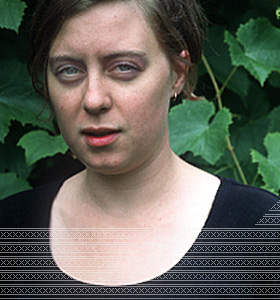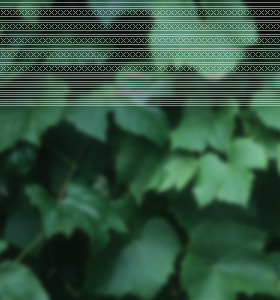Wednesday, February 18, 2026 |
||

THE UNWOUND SOUND // Ten years on, the Olympia, Wash.-based punk rockers have delivered an epic album that finds them... well, artier than ever. |
|
| Interview Jenny Tatone Photography Jim McGinnis | |

Sara Lund 
"Sometimes the songs make sense and sometimes they don't. I don't usually go for a subject, just word play." — Justin Trosper |
Tatone: Could you talk about the writing and recording of Leaves Turn Inside You? I think it's a great album.
Trosper: We recorded it ourselves here in the basement — that was the major change. We decided to record it at home, so that changed the whole process, as opposed to having everything ready and jumping into the studio. There was a lot more space to write things. A lot of the songs were basically written the same as before, but we had more time to think about it and develop them in production. That's one of the big differences with this record. The last record (1998's Challenge for A Civilized Society), Steve Fisk [Pigeonhed; Pacific NorthWest producer] did a really good job producing, and he really put his stamp on it. It definitely had the most production up until then, and this one we just took it a little further. We used a lot of the same ideas that he did on the last one. Production and arranging are a really big part of this record; more than previous. I personally was inspired by listening to album production, more than just the tunes. Tatone: Was there something specific you experimented with for the first time? Trosper: A couple songs were written from the ground up in the studio. And not just pounding out, like rock-band style. Tatone: Which songs are those? Trosper: "One Lick Less" and "Who Cares," which is a short instrumental. Some of the songs were older [ones] that we tried out live a couple years ago. Tatone: When I've listened to the album, I get this really moody feel, like it could almost be a soundtrack. Trosper: Yeah, I'm definitely influenced by soundtracks. I was thinking a lot about movies when we were making that record, trying to get that epic scope into it. Having that much time was good, to allow [time] to think about how the songs were gonna fit, how to produce them. Some of them were like, "Oh yeah, those ones have to go together." A lot of them fit together like that; kinda like how people who do movies shape a scene here and then put a song in sequence there. It worked out like that because there's a lot of different little moods to try to fit together. So that was cool, as opposed to having a series of just rock songs. We could tone down some of them by making them washier and more heady. Tatone: Were there any specific movies you were thinking about? Trosper: One that sticks out that had a big effect on me last year was "Pola X" ["Pola X," based on "Pierre," a novel by Herman Melville, was directed by Leos Carax]. That was a melodramatic movie. I was just like, "Wow!" [It's] not realistic, not based in reality at all, totally out there. Not even psychedelic. It's not goofy. You're just like, "I can't believe this is happening now," over and over! And then all of a sudden something out-of-the-blue, insane, happened. I thought that was a really inspiring movie in the artistic overtones [it had]. All the movies I've seen by Leos Carax, all of his movies just blow me away. Tatone: Out of all the songs, the one that really gave me that soundtrack feeling the most was "Below the Salt." Could you talk about writing that? Trosper: That was the last one we wrote. The original recording we used was just a practice tape. We only played it twice. We wanted there to be piano so we just sort of banged out some piano stuff and built on it. I was trying to get Vern [Rumsey] to come up with some bass lines that actually turned into a Led Zeppelin part — "No Quarter," heavy riff style. That's definitely one of our favorites. It's really long, but it keeps shifting and changing — it felt like it summed up the album. Tatone: Is it the closing track? Trosper: Kind of. Well, there's "Who Cares," which is just an instrumental bit. Actually "Who Cares" is a variation on the first song of the album ["We Invent You"]. We were doing a reprise, just added it to the end. Tatone: Has it had the impact you hoped it would, so far? Trosper: Yeah. I knew people would react to it more than our other records. To me, it seemed like a pretty natural progression. But some people were like, "Woah! You guys sound totally different!" I guess it does. It's hard for me to tell, because I've worked on it so much. But we've had really positive reactions. I don't know how it's selling or anything, but I don't care. I think finally finishing it and having it come out in a package was inspiring to everybody in the band. Everybody is proud of it. Some people can have this one strong element that they do really well that works over and over. That's key to a strong audience. But then there's other people that are constantly evolving, and there's an audience for that too. Our changes, a lot of them have been really subtle. With this record it's a more obvious shift. But we have to keep changing, to keep our interest alive in the band. We feel like when we're playing or writing new songs, or actually releasing a new record, we're trying to at least do something [so] whoever is gonna listen to it is gonna gain something from it, especially people that have been following us for awhile and like to see the progression. We have that sort of personal satisfaction like, "Oh yeah, we're not ripping the fan off." |